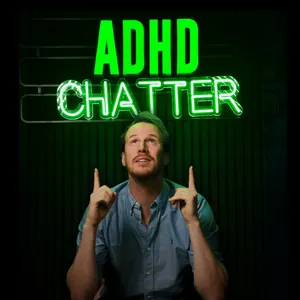Podcast Summary
Celebrate Mother's Day with Blue Nile and Mint Mobile, or get help with weight loss from PlushCare: Blue Nile offers exquisite pearls and gemstones for Mother's Day with fast shipping and discounts. Mint Mobile cuts its price for unlimited data to $15 a month for new customers. PlushCare provides online access to board-certified physicians for weight loss medication prescriptions.
This Mother's Day, express your love and appreciation to the extraordinary women in your life with a heartfelt gift from Blue Nile. Their exquisite pearls and mesmerizing gemstones come with fast shipping options and discounts, making this Mother's Day unforgettable. Meanwhile, Mint Mobile is cutting its price for unlimited data from $30 to $15 a month, offering a more affordable way for new customers to connect. Additionally, PlushCare provides online access to board-certified physicians who can prescribe weight loss medications for those who qualify. Jay from ADHD Chatter shared his earliest memories of displaying ADHD traits, such as hyperfixation on Barney and ketchup. These obsessions would last for a short period before he moved on to something new, causing frustration for his parents. This cycle of obsession and loss of interest has continued into his adulthood, leaving him with numerous hobbies but none that he's successfully pursued for an extended period. Both Blue Nile and Mint Mobile offer unique solutions to make life more convenient and affordable for consumers, while PlushCare provides a valuable resource for those seeking help with weight loss. By exploring these opportunities, we can enhance our experiences and find joy in the everyday.
The addictive nature of social media for content creators: Focus on positive feedback, brush off negatives, and maintain a lighthearted perspective to succeed on social media
Social media's constant change and instant gratification feeds the need for individuals with quick-paced brains, making it an addictive platform for content creation and engagement. The speaker acknowledges the toll it can take but emphasizes the importance of focusing on positive feedback and brushing off negative comments. Neurodivergent conditions, such as ADHD, may contribute to this success by providing the energy and creativity required for high-engagement content. Despite the challenges, the speaker encourages treating negative comments as a joke and maintaining a lighthearted perspective.
Recognizing the importance of self-care for increased energy and productivity: Prioritizing self-care leads to improved mood, energy, and productivity. Honoring body's signals for rest is essential for long-term well-being.
Prioritizing self-care and listening to your body's needs can lead to increased energy and productivity. The speaker shares how dancing and creating social media content provides her with a dopamine boost, helping her overcome burnout and improve her mood. In the past, she coped with stress through constant activity and shopping, but these habits were not sustainable and did not lead to long-term well-being. Now, she recognizes the importance of taking breaks and giving herself permission to rest when needed. By honoring her body's signals, she is able to work more effectively and maintain a better overall sense of well-being.
Managing Money with ADHD: Personal Experiences and Strategies: Recognizing and addressing the unique challenges of managing money and staying organized with ADHD requires intentional effort and consistent self-awareness. Strategies include deleting shopping apps, creating budget spreadsheets, and seeking professional help.
Understanding and managing ADHD, especially in relation to money, requires intentional effort and consistent self-awareness. The speaker shared their personal experience of impulsive buying, justifying purchases with numerous reasons, and then forgetting about the need for budgeting and organization. They acknowledged the challenges of managing money with ADHD, especially with the convenience of online shopping. The speaker suggested strategies like deleting shopping apps, creating budget spreadsheets, and seeking professional help when needed. They also reflected on their late diagnosis of ADHD and the emotional impact it had, including relief, validation, and frustration. Overall, the conversation underscores the importance of recognizing and addressing the unique challenges of managing money and staying organized with ADHD.
Reflecting on past relationships and emotions after an ADHD diagnosis: An ADHD diagnosis later in life can bring up emotions, but having supportive friends who understand can lead to stronger relationships.
Receiving an ADHD diagnosis later in life can bring up unexpected emotions, including grief, as individuals reflect on past experiences and relationships that may have been negatively impacted by undiagnosed ADHD. Maintaining friendships can be a challenge due to communication differences and the "out of sight, out of mind" nature of the ADHD brain. However, having a supportive circle of friends who understand these differences can lead to stronger, more meaningful relationships. It's important for individuals with ADHD to remember that their experiences and ways of operating are valid, and that open communication and education can help bridge any misunderstandings.
Masking and mirroring in relationships for people with ADHD and autism: People with ADHD and autism may hide their true selves in relationships due to low self-esteem and a need to please, but self-discovery and acceptance can lead to authentic self-expression and stronger connections.
People with ADHD and autism may mask or mirror in relationships due to low self-esteem and a desire to please their partners. This can lead to a lack of authentic self-expression and confusion about personal feelings. However, through self-discovery and acceptance, individuals can learn to be true to themselves and form healthier, more fulfilling relationships. The journey of self-awareness and healing is essential, allowing one to present their authentic self to the world and build strong connections based on genuine understanding and acceptance.
Effective communication in relationships for those with ADHD: Find ways to communicate effectively, such as taking timeouts, using buzzwords, or being honest about feelings. Individuals with ADHD bring positivity through childlike fun, spontaneity, and optimism.
Effective communication is key in relationships, especially for those with ADHD. While initiating communication can be challenging due to fear of conflict or saying the wrong thing, it's essential to find a way to communicate that works for both parties. This may involve taking timeouts, using buzzwords to reset discussions, or being honest about feelings. Additionally, individuals with ADHD can bring positivity to relationships through their childlike fun, spontaneity, and optimism. These strengths can help keep things light and provide a source of encouragement during stressful times. Remember, it's important to understand each other's unique perspectives and communicate openly to build a strong and healthy relationship.
Navigating the complexities of finding the right ADHD medication: Persist through the process of trying different medications and dosages to find the right fit for significant improvements in focus, awareness, and productivity.
The journey of starting and finding the right medication for ADHD can be a complicated and unpredictable process. It may not be an easy fix, and there can be side effects and challenges along the way. But for those who persist, the benefits can be significant, leading to increased focus, awareness, and productivity. The speaker shared her personal experience of going through this process, documenting it openly on social media to help others understand the complexities involved. She emphasized the importance of being willing to try different medications and dosages to find what works best, and the potential for a transformative improvement in daily life once the right fit is found.
Managing ADHD: Finding what works best: Medication and routines help manage ADHD. Morning routines maximize productivity, while acknowledging the pros and cons of medication. Imposter syndrome can be reframed as a reminder of accomplishments.
Managing ADHD involves finding what works best for the individual, including the use of medication and establishing routines. The speaker shared her experience of taking medication to help focus and start her day productively, while acknowledging the pros and cons of taking it or not. She also emphasized the importance of getting ready in the morning as part of her routine to maximize the benefits of ADHD. Furthermore, she openly discussed her experiences with imposter syndrome but reframed it as a positive reminder of her accomplishments and journey.
Imposter syndrome: When subconscious mind lags behind personal growth: Recognize progress, embrace accomplishments, and respect limitations to overcome imposter syndrome.
Imposter syndrome, the feeling of being a fraud despite accomplishments, can arise when rapid personal growth outpaces the subconscious mind's acceptance of those achievements. Jay's perspective, as shared during the podcast, resonates with this idea. He emphasized that it's essential to acknowledge the progress made and embrace the reality of one's accomplishments, even if the subconscious mind might not have caught up yet. Moreover, Jay also shared a personal story about his video production method, where he sometimes overextends himself and experiences accidents, like slipping on the wooden floor. These incidents serve as reminders that limitations exist, and it's crucial to respect them. The conversation also touched upon the importance of recognizing and celebrating the achievements of mothers during Mother's Day. The podcast concluded with sponsor messages from 1-800-Flowers and Whole Foods Market, offering special deals for Mother's Day gifts. Boll and Branch's organic cotton sheets were also introduced as a sponsor, with a promise of getting softer with each wash. The conversation concluded with a reminder to appreciate and celebrate the mothers in our lives and the importance of self-acceptance and acknowledgment of personal growth.





